unit1topic2sectionA
- 格式:doc
- 大小:78.40 KB
- 文档页数:5
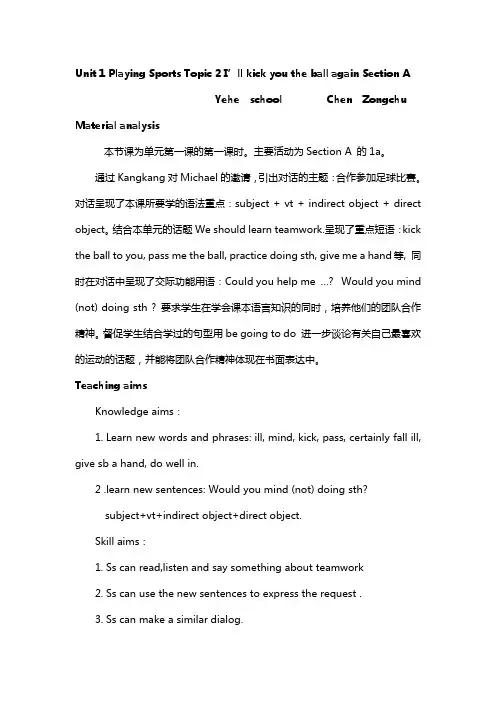
Unit 1 Playing Sports Topic 2 I’ll kick you the ball again Section AYehe school Chen Zongchu Material analysis本节课为单元第一课的第一课时。
主要活动为Section A 的1a。
通过Kangkang对Michael的邀请,引出对话的主题:合作参加足球比赛。
对话呈现了本课所要学的语法重点:subject + vt + indirect object + direct object。
结合本单元的话题We should learn teamwork.呈现了重点短语:kick the ball to you, pass me the ball, practice doing sth, give me a hand等, 同时在对话中呈现了交际功能用语:Could you help me …? Would you mind (not) doing sth ? 要求学生在学会课本语言知识的同时,培养他们的团队合作精神。
督促学生结合学过的句型用be going to do 进一步谈论有关自己最喜欢的运动的话题,并能将团队合作精神体现在书面表达中。
Teaching aimsKnowledge aims:1.Learn new words and phrases: ill, mind, kick, pass, certainly fall ill, give sb a hand, do well in.2 .learn new sentences: Would you mind (not) doing sth?subject+vt+indirect object+direct object.Skill aims:1.Ss can read,listen and say something about teamwork2.Ss can use the new sentences to express the request .3.Ss can make a similar dialog.Emotional aims:a friend in need is a friend indeed.The key points and difficult pointsKey points:Would you mind (not) doing sth?Difficult points:1. 双宾语:subject + vt + indirect object + direct object.2.1c活动中近义句的转换。
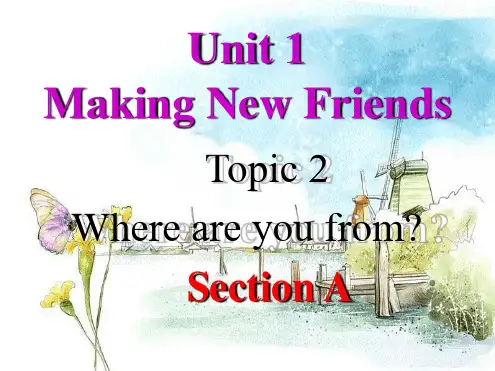
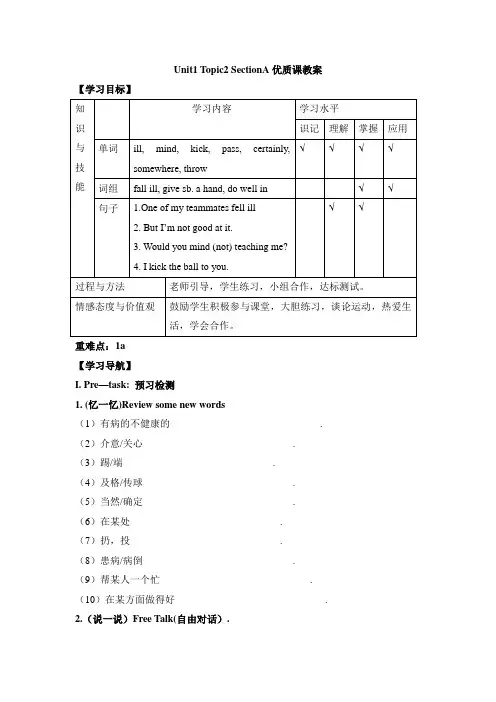
Unit1 Topic2 SectionA优质课教案【学习目标】重难点:1a【学习导航】I. Pre—task: 预习检测1. (忆一忆)Review some new words(1)有病的不健康的______________________________. (2)介意/关心______________________________.(3)踢/端______________________________.(4)及格/传球______________________________.(5)当然/确定______________________________.(6)在某处______________________________.(7)扔,投______________________________.(8)患病/病倒______________________________.(9)帮某人一个忙______________________________. (10)在某方面做得好______________________________.2.(说一说)Free Talk(自由对话).Ⅱ. While—task:(学一学)呈现、巩固和练习1.(听一听)Listen to 1a and answer(1)Which class are they going to play against?(2)What’s wrong with Kangkang’s teammate?(3)Would Kangkang mind teaching him?2.(读一读)Read la and complete the sentences.(1)Kangkang and his team are going to have a soccer game against on Saturday. (2)Kangkang asks Michael to join them because a teammate.(3)Michael is not good at but he likes to have a try.(4)Michael and Kangkang are going to for the game.3.(比一比)Work in groups and find out the key points.4.(试一试):(1)Make sentences with the key points(2)Read 1a in roles.ⅢPost—task(说一说)Summary(分享收获)【自我检测】(练一练)(10分)1. Listen to the conversations and number the pictures. (4分)()()()()2. Choose the best answers. (6分)( ) 1.—I’d like to read the book over there. Could you pass ______, please?—Certainly. Here you are.A. me itB. it to meC. me for itD. it for me。
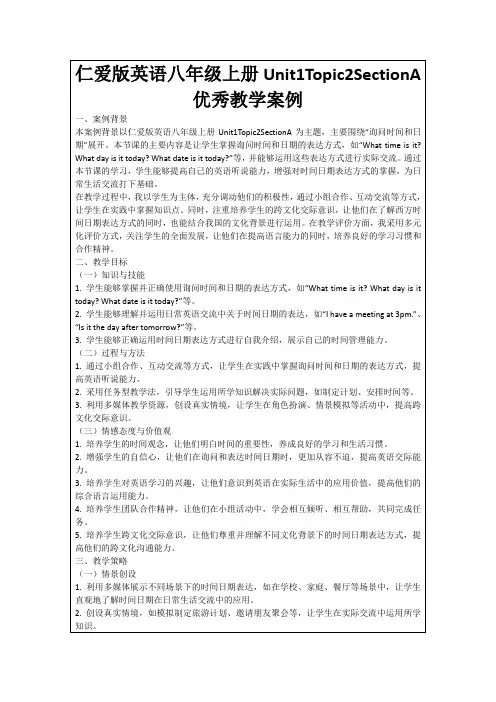
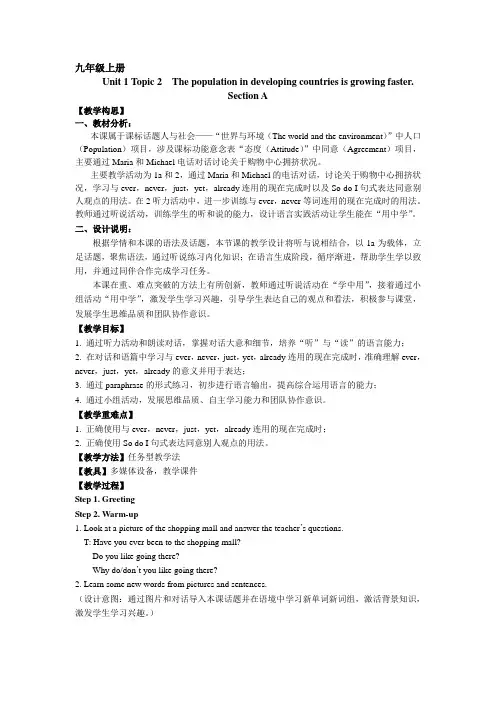
九年级上册Unit 1 Topic 2 The population in developing countries is growing faster.Section A【教学构思】一、教材分析:本课属于课标话题人与社会——“世界与环境(The world and the environment)”中人口(Population)项目,涉及课标功能意念表“态度(Attitude)”中同意(Agreement)项目,主要通过Maria和Michael电话对话讨论关于购物中心拥挤状况。
主要教学活动为1a和2,通过Maria和Michael的电话对话,讨论关于购物中心拥挤状况,学习与ever,never,just,yet,already连用的现在完成时以及So do I句式表达同意别人观点的用法。
在2听力活动中,进一步训练与ever,never等词连用的现在完成时的用法。
教师通过听说活动,训练学生的听和说的能力,设计语言实践活动让学生能在“用中学”。
二、设计说明:根据学情和本课的语法及话题,本节课的教学设计将听与说相结合,以1a为载体,立足话题,聚焦语法,通过听说练习内化知识;在语言生成阶段,循序渐进,帮助学生学以致用,并通过同伴合作完成学习任务。
本课在重、难点突破的方法上有所创新,教师通过听说活动在“学中用”,接着通过小组活动“用中学”,激发学生学习兴趣,引导学生表达自己的观点和看法,积极参与课堂,发展学生思维品质和团队协作意识。
【教学目标】1. 通过听力活动和朗读对话,掌握对话大意和细节,培养“听”与“读”的语言能力;2. 在对话和语篇中学习与ever,never,just,yet,already连用的现在完成时,准确理解ever,never,just,yet,already的意义并用于表达;3. 通过paraphrase的形式练习,初步进行语言输出,提高综合运用语言的能力;4. 通过小组活动,发展思维品质、自主学习能力和团队协作意识。
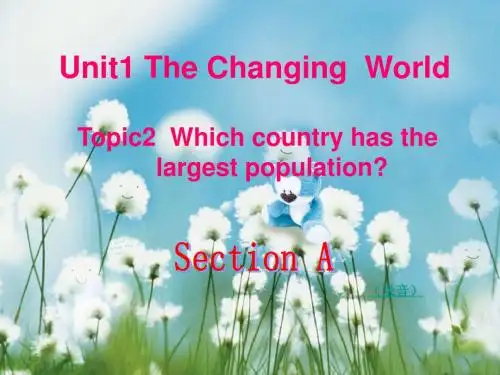
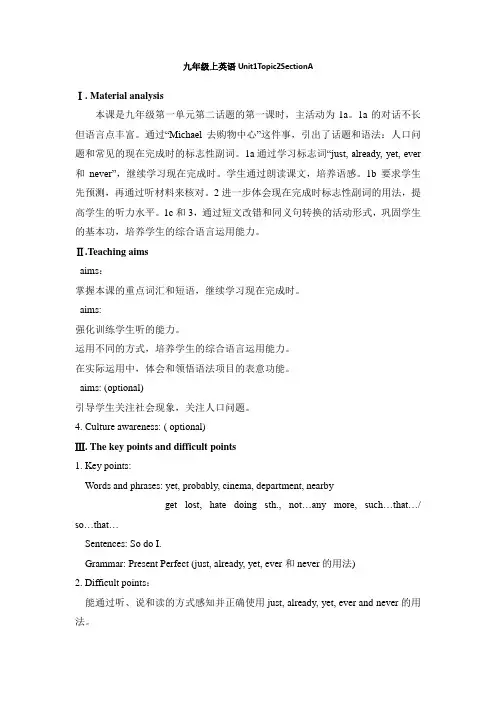
九年级上英语Unit1Topic2SectionAⅠ. Material analysis本课是九年级第一单元第二话题的第一课时,主活动为1a。
1a的对话不长但语言点丰富。
通过“Michael去购物中心”这件事,引出了话题和语法:人口问题和常见的现在完成时的标志性副词。
1a通过学习标志词“just, already, yet, ever 和never”,继续学习现在完成时。
学生通过朗读课文,培养语感。
1b要求学生先预测,再通过听材料来核对。
2进一步体会现在完成时标志性副词的用法,提高学生的听力水平。
1c和3,通过短文改错和同义句转换的活动形式,巩固学生的基本功,培养学生的综合语言运用能力。
Ⅱ.Teaching aimsaims:掌握本课的重点词汇和短语,继续学习现在完成时。
aims:强化训练学生听的能力。
运用不同的方式,培养学生的综合语言运用能力。
在实际运用中,体会和领悟语法项目的表意功能。
aims: (optional)引导学生关注社会现象,关注人口问题。
4. Culture awareness: ( optional)Ⅲ. The key points and difficult points1. Key points:Words and phrases: yet, probably, cinema, department, nearbyget lost, hate doing sth., not…any more, such…that…/ so…that…Sentences: So do I.Grammar: Present Perfect (just, already, yet, ever和never的用法)2. Difficult points:能通过听、说和读的方式感知并正确使用just, already, yet, ever and never的用法。
能自如运用不同语言点表达相同信息。
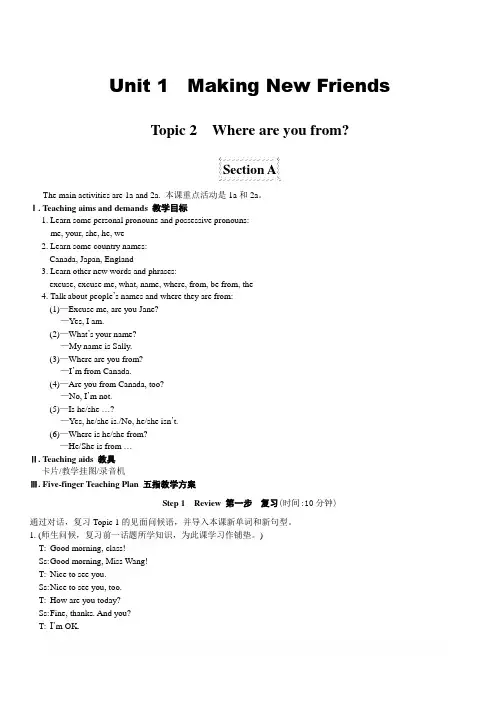
Unit 1 Making New FriendsTopic 2 Where are you from?Section AThe main activities are 1a and 2a. 本课重点活动是1a和2a。
Ⅰ. Teaching aims and demands 教学目标1. Learn some personal pronouns and possessive pronouns:me, your, she, he, we2. Learn some country names:Canada, Japan, England3. Learn other new words and phrases:excuse, excuse me, what, name, where, from, be from, the4. Talk about people’s names and where they are from:(1)—Excuse me, are you Jane?—Yes, I am.(2)—What’s your name?—My name is Sally.(3)—Where are you from?—I’m from Canada.(4)—Are you from Canada, too?—No, I’m not.(5)—Is he/she …?—Yes, he/she is./No, he/she isn’t.(6)—Where is he/she from?—He/She is from …Ⅱ. Teaching aids 教具卡片/教学挂图/录音机Ⅲ. Five-finger Teaching Plan 五指教学方案Step 1 Review 第一步复习(时间:10分钟)通过对话,复习Topic 1的见面问候语,并导入本课新单词和新句型。
1. (师生问候,复习前一话题所学知识,为此课学习作铺垫。
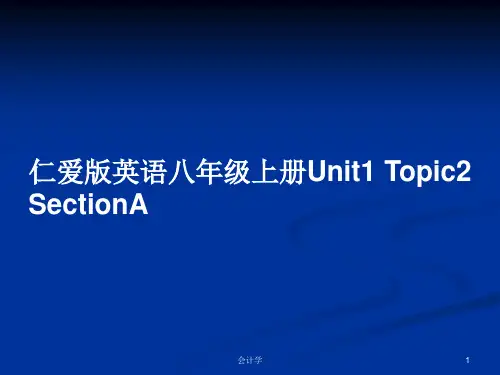
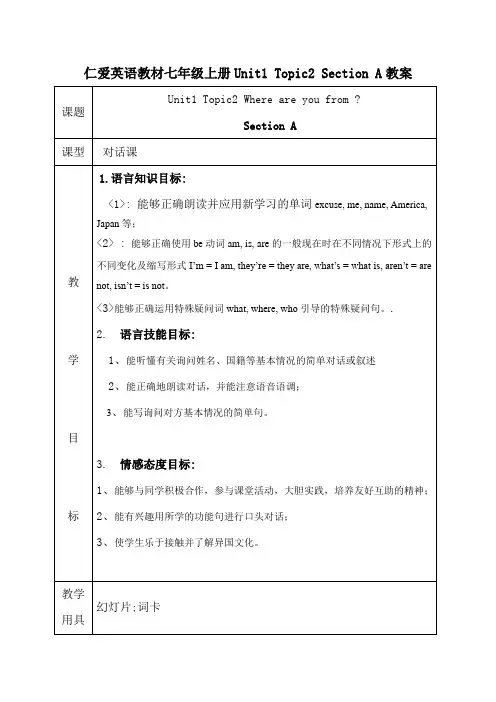
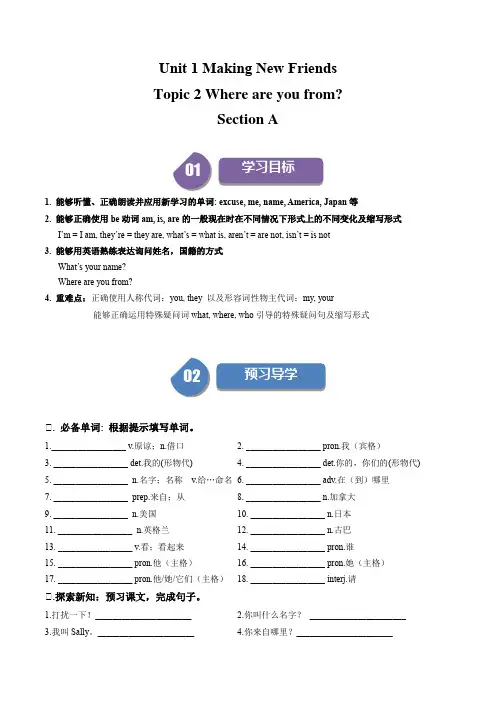
Unit 1 Making New FriendsTopic 2 Where are you from?Section A011. 能够听懂、正确朗读并应用新学习的单词: excuse, me, name, America, Japan等2. 能够正确使用be动词am, is, are的一般现在时在不同情况下形式上的不同变化及缩写形式I’m = I am, they’re = they are, what’s = what is, aren’t = are not, isn’t = is not3. 能够用英语熟练表达询问姓名,国籍的方式What’s your name?Where are you from?4. 重难点:正确使用人称代词:you, they 以及形容词性物主代词:my, your能够正确运用特殊疑问词what, where, who引导的特殊疑问句及缩写形式02Ⅰ. 必备单词: 根据提示填写单词。
1._________________ v.原谅;n.借口2. _________________ pron.我(宾格)3. _________________ det.我的(形物代)4. _________________ det.你的,你们的(形物代)5. _________________n.名字;名称v.给…命名6. _________________ adv.在(到)哪里7. _________________prep.来自;从8. _________________ n.加拿大9. _________________n.美国10. _________________ n.日本11. _________________n.英格兰12. _________________ n.古巴13. _________________ v.看;看起来14. _________________ pron.谁15. _________________ pron.他(主格)16. _________________ pron.她(主格)17. _________________ pron.他/她/它们(主格)18. _________________ interj.请Ⅰ.探索新知:预习课文,完成句子。
Unit 1 Topic2 SectionA教案Ⅰ. Teaching aims and demands1. Learn some new wordsill , mind, kick,pass,certainly, somewhere, throw,2.Learn some useful phrases:fall ill ,be glad to,give sb.a hand ,do well in3. Learn to make requests and responses:(1)—Could you help me,please?—Sure. What is it?(2)—Will you join us?—I’d be glad to.(3)—Would you mind teaching me?—Not at all.(4)—Would you mind if I try it again?—Certainly not. Please do.(5)—Do you mind not putting your bike here?—Sorry. I’ll put it somewhere else.(6)—Would you mind not throwing bottles around?—I’m sorry about that. I won’t do it again.4.To learn the subject+vt.+indirect +direct objects sentences II.Teaching key points:1.Would you mind (not) doing sth?2.Do you mind (not) doing sth?3.Would you mind if…4.Will you …?III. Teaching difficult points:1. the subject+vt.+indirect +direct objects sentences2.The requests and responses3.The transform of synonyms in 1cIV .Teaching aidsTape recorder multi-mediaV. Teaching proceduresStep 1 Lead-inTo present the new words and phrases in 1a(1)show a picture that a boy falls illT:Look !What’s wrong with Xiaoming ?Ss:生病(shēng bìng)了T:Yes,he falls ill .Could you help me,please,S1S1:Sure ,What is it ?T:Xiaoming can’t go to school because he falls ill .Would you mind teaching him English?S1(Help)Not at all .Pratice with another students and present be ill , give sb. a hand ,Do you mind…, certainly ,of course not ,(2) Present Will you …T: We know doing sports is good for our health,S2,will you play basketball with me ? S2:I’d be glad to.pratice with different students(3)Present kick and passT:Look ,What’re they doing ?Ss:They’re playing soccer.T:Yes ,and they’re kicking the ball.T:What’s the boy doing?Ss :传球(chuán qiú)。
Unit1 Topic2 SectionA
1.在家be in=be at home 外出be out
2.just刚刚(用于现在完成时)
just now刚才(用于一般过去时)
3.before以前(用于现在完成时)
ago以前(用于一般过去时)
4.不再not···any more=no more (数量上)
not···any longer=no longer (时间上)5.太多too many=many(后跟可数名词复数)太多too much=much(后跟不可数名词)
太much too=too(后跟形/副)
6.走失get lost=be lost=lose one’s way
7.打电话call sb. up=ring sb. up=phone sb.
=telephone sb. =give sb. a call
=give sb. a ring=make a telephone call to sb.
8.像那样like that
9.我也是。
So do I.(如果一个人的肯定情况也适合另一个人,用:So+be/助/情动+另一个主语)
10.我也不。
Neither/Nor do I.
(如果一个人的否定情况也适合另一个人,用Neither/Nor+be/助/情动+另一个主语)
11.现在完成时的标志词:
just刚刚(用于肯定句)
ever曾经(用于疑问句)
never从不(用来构成否定句)
yet还,仍(用于疑问句或否定句末)
already已经(用于肯定句中/末)。
Unit1Topic2SectionA九年级上学期英语课前预习过关练(仁爱版)一.根据音标及短语写出单词和汉语意思。
【答案】实战演练:根据首字母或括号中所给词的提示写出单词。
1. So many people have caught a cold recently. It’s p_______ because of the bad air.2. We don’t see a film in the open air any more. We often go to the c_______.3. Is there a toilet ______(near)? I’m in great need of it.4. China has the largest p_______ in the world.5.1 haven’t found my pet dog y_______.【答案】1. probably2. cinema3. nearby4. population5. yet二.短语译一译1.在家2.不再3.迷路4.给某人打电话5.购物中心6.中央公园7.百货商店8.通过电话交谈9.住在这儿【答案】1.be in/ at home2.not… any more=no more3.get/be lost=lose one’s way4.call sb. up5.shopping center6.△central park7.department store8.talk on the phone=talk by phone9.△have been living here=have lived here三.知识点理一理:现在完成时态中already, yet, just, never, ever用法区别1、already意思是“已经”①通常用于陈述句中(放在have和has的后面)②也可用于疑问句,表示期望得到肯定的回答或表示惊异,此时already常放在句末。
八年级上册英语导学学案Unit 1 Topic 2 Would you mind passing me some water?Section A一、学习目标Aims and demands1、掌握新词汇: mind, favor, ill, practice, pass, somewhere, throw, manage;2、学习新的表达形式: do sb a favor, fall ill, throw bottles around, make one’s bed;3、继续学习一般将来时----- will+动词原形二、学法指导How to study1、预习Unit 1 Topic2 Section A,并对语言点、难点做出标记;2、学习学案,并完成学案上的练习题。
三、自主预习Ⅰ.英汉互译下列单词并标上词性。
1.思想、头脑__________( )2. 好心,帮助___________( )3. ill __________( )4. 练习___________( )5. 通过__________( )6.somewhere ___________( )7. 扔、抛__________( )8. 设法___________( ) II.在课本中找出下列短语划在书上并翻译1、do me a favor _________________2、fall ill _____________________3、be glad to _________________4、right away __________________5、throw bottles around ________________6、make one’s bed ______________ Ⅲ. 翻译并熟记下列句子.1.迈克,你能帮我个忙吗? _________________________________2. 但是我的一个队友生病了。
_________________________________3. –你愿意教我吗?____________________--当然可以______________4. 让我们一起去练习吧。
. _________________________________5. --让我再试一次你介意吗?_________________________________--当然不介意_____________________________________6. --请不要把你的自行车放在这儿好吗?_________________________________ --对不起,我马上把它放到别处去。
___________________________________7. --请你不要把瓶子乱扔好吗?_________________________________--对不起,我以后不这样做了。
_______________________________8. 你真是太好了,不过我自己能设法做好。
_______________________________【课文原句】____________________________________________【分析点拨】(1) Could you please…? = Would you please…?都表示客气、委婉地提出请求,“请……好吗”,此处could不表示过去式。
如:Could you please help me study English?翻译:__________________________Could you please clean the classroom with me?翻译:__________________________(2) do sb a favor = give sb a hand = help sb 帮某人的忙如:Maria:Linda. Could you do me a favor?Linda:Yes?Maria:We would like to have a party this weekend. Could you please help us prepare the food and drinks?Linda:It’s my pleasure. (请试着口头翻译以上对话)2.【课文原句】But one of my teammates fell ill.译文____________________________________________.(1) one of + 可数名词复数,意为“……中之一”,当它作主语时,谓语动词用______数形式如:One of my friends is a boy. One of his sisters is a doctor.(2) fall ill 生病,得病fall在此为系动词,fell是fall的过去式,如:My mother fell ill yesterday, so I have to look after her at home today.翻译:_________________________________________________________ She is very weak. She often falls ill. 翻译:______________________________ 【知识链接】be ill, fall ill, feel illbe ill 有病的,得病的,强调的是一种状态;fall ill 生病,得病,强调的是动作,由没病到生病的过程,如:He is ill now. (强调________)翻译:_____________________Don't be tired, or you will fall ill. (强调________)翻译:_____________________feel ill 感觉不舒服,重在一种身体感受,如:Are you feeling ill now? 翻译:___________________________________I feel ill these days. 翻译:___________________________________3.【课文原句】Will you join us? ----- I'd be glad to.译文__________________________________________________________.(1) will 在这表示“劳烦别人做事或请求别人做事”,不表示将来时态。
(2) I'd be glad to.是I would be glad to. 的缩写,答语中to 后的动词可以省略,但to不能省略。
be glad to…乐意做……,如:I'm glad to see you again.我很乐意帮助你。
翻译:___________________________________4、【课文原句】Will you join us? ----- I'd be glad to.译文__________________________________________________________. (1)Would you mind…? 意为“你介意……吗”?这是英语中委婉请求的表达方式,语气委婉、客气、礼貌,易于被对方接受,其结构是:Would you mind + 动名词+ 其他?同义句是Could you please do sth? 该句的否定形式为Would you mind not doing sth? 意为“别做……好吗”?如:Would you mind opening the window ? _____________________Would you mind doing me a little favor?________ _______________________ Would you mind mailing this letter for me? __________________________Would you mind passing the dictionary to him ? ________________________ Would you mind not smoking? ______________________________________(2)常用用法还有:①Would you mind + 名词宾格/形容词性物主代词+ doing sth?如:Would you mind me/my smoking here? 翻译:__________________________ Would you mind me/my opening the window? 翻译:________________________注意:动名词前可加一个逻辑主语,一般用形容词性物主代词或名词所有格,用与不用意义不同。
如:Do you mind smoking here? 你介意在这儿抽支烟吗?(你抽烟)Do you mind my smoking here? 你介意我在这儿抽支烟吗?(我抽烟)②Would you mind + if 从句。
如:Would you mind if I smoke?翻译:_______________________________________(3) Would you mind 句型一般用在面对陌生人时或者非常正式的场合,用来表达委婉、客气的意愿,不用在朋友之间,或者普通、随便的场合。
注意:Would you mind 后面不能加不定式,would you mind 用来表示要求许可或者请求别人做事,后面常接doing 或if从句。
回答时,如果要拒绝对方的提议时,常用I'm sorry…或I'm afraid you'd better not.等表示委婉的拒绝,如果听从对方的提议,常用Certainly not. / Of course not. / No, not at all. 等表示赞同和接受,不能用yes。
【拓展】和mind有关的常用短语有:never mind 没关系,一点也不介意make up one's mind 下决心keep…in mind 记住……change one's mind 改变主意5.【课文原句】But I can manage it myself.译文_____________________________________.(1) manage ( v.) 管理,设法对付,通过努力完成某事,在口语中常和can, could, be able to连用,如:Can you manage another piece of cake? 你还能再吃块蛋糕吗?(2) myself 在本句中做主语的同位语,如:I cooked the meal myself. 翻译:________________________________I cleaned the house myself. 翻译:________________________________四、课堂导学与风采展示1. 重点回顾根据自主预习的内容,组内核对并相互提问重点短语,句子以及用法2. 风采展示1). 分角色朗读1a, 完成1b。